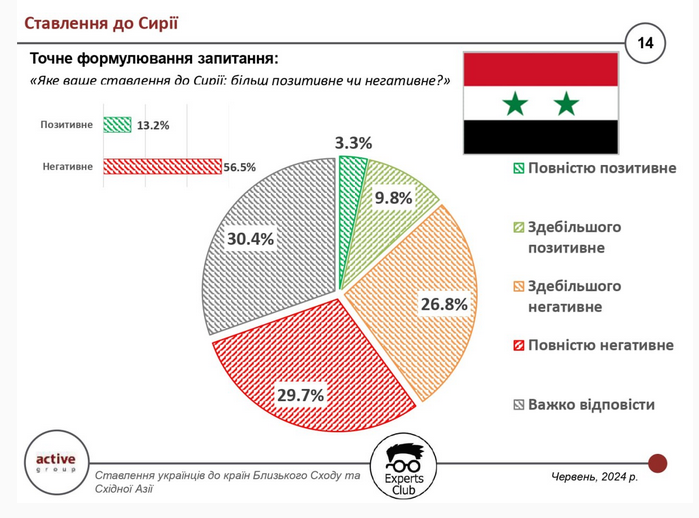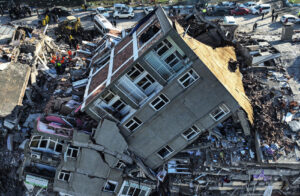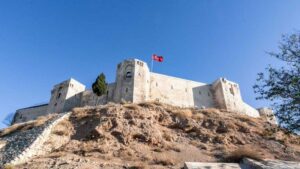
Three cargo ships carrying more than 70,000 tons of wheat arrived at the port of Tartus in Syria as part of a program to strengthen strategic grain reserves and meet domestic market needs, local publication sana.sy reported, citing information from the port administration.
“Three ships loaded with more than 70,000 tons of wheat arrived at the port of Tartus for the General Directorate of Grain Trade and Processing as part of the government’s ongoing efforts to strengthen strategic grain reserves and meet the needs of the local wheat market,” the publication noted.
Yousef Arnous, the port’s operations manager, said that two ships brought grain from Ukraine and one from Russia, and they’re currently being unloaded. Part of the cargo will be stored in the port’s grain silos, while the rest will be transported by truck and rail to meet local market needs and ensure food security.
He added that a fourth ship with 26,000 tons of wheat is waiting to be unloaded, and there are signs that additional ships loaded with approximately 50,000 tons will arrive in the near future.
Nidal Abdel Kader, assistant director of the Tartus branch of the railway, said that one of the ships, called Golden Nour, arrived in Tartus with a cargo of more than 30,000 tons of wheat. Part of this cargo was delivered to the Ash-Shinshar elevators, and this is already the fourth delivery in the last period.
The publication recalled that on November 5, four ships carrying 94,000 tons of wheat arrived at the port of Tartus to replenish strategic reserves and meet the needs of mills in various provinces of Syria.

Ukraine has supplied an additional 3,850 tons of wheat flour to Syria as part of President Volodymyr Zelenskyy’s humanitarian program Grain From Ukraine, Foreign Minister Andriy Sybiga said.
“Together with 500 tons in December, this will provide 60 thousand Syrians for six months,” he wrote on social networking site X.
Sybiga assured that Ukraine continues to support the Syrian people and food security in the Middle East.

The first 500 tons of wheat flour under the Grain from Ukraine program are to be delivered to Syria tomorrow, followed by new deliveries and deepening cooperation in many areas, President of Ukraine Volodymyr Zelenskyy said.
“On my instructions, Minister of Foreign Affairs of Ukraine Andriy Sybiga and Minister of Agrarian Policy and Food Vitaliy Koval paid a visit to Damascus. The Ukrainian delegation held important talks with the Syrian administration, leader Ahmed al-Sharaa and ministers,” Zelensky wrote on social media platform X on Monday.
According to him, the Ukrainian side supports the Syrian people in their efforts to overcome decades of dictatorial rule and restore stability, security and normal life in Syria.
“As we promised, the first 500 tons of Ukrainian wheat flour should arrive tomorrow. And then there will be new deliveries, as well as deepening of mutually beneficial cooperation in many areas,” Zelenskyy emphasized.
He added that Ukraine appreciates the chance to restore normal and stable life in Syria and is ready to develop long-term, strategic relations.
“I expect Ministers Sibiga and Koval to report on the results of their visit upon their return to Ukraine,” the President emphasized.

Active Group and Experts Club have conducted a joint study on the attitudes of Ukrainians towards the countries of East Asia and the Middle East. The study was presented at the Interfax-Ukraine news agency in June 2024. The research was presented by Maksym Urakin and Oleksandr Poznyi. The results of the study are as follows:

The results of the survey are as follows:
Completely positive – 3.3%.
Mostly positive – 9.8
Mostly negative – 26.8
Completely negative – 29.7 %.
Difficult to answer – 30.4%.
Positive – Negative – 43.3
On March 31, 1992, diplomatic relations between Ukraine and the Syrian Arab Republic were established.
The joint research by Active Group and Experts Club on the attitudes of Ukrainians towards the countries of East Asia and the Middle East was conducted in April-May 2024. It covers such countries as Turkey, Iran, Israel, Egypt, Jordan, Saudi Arabia, UAE, Afghanistan, Pakistan, Azerbaijan, Uzbekistan, Turkmenistan, Kyrgyzstan, Tajikistan, Kazakhstan, Georgia, Armenia, India, China, Republic of Korea, DPRK, Japan, Vietnam, Indonesia, Syria, and Iraq. Full information on the research is available on the website of the Club of Experts at
https://expertsclub.eu/cpilne-doslidzhennya-kompaniyi-active-group-ta-experts-club-shhodo-stavlennya-ukrayincziv-do-krayin-shidnoyi-aziyi-ta-blyzkogo-shodu/
Video – https://interfax.com.ua/news/video/993142.html

The number of victims of earthquakes that occurred in early February in the south-east of Turkey has reached nearly 46 thousand people, the country’s Interior Minister Suleyman Soylu said.
“So far, 45,968,000 people have died as a result of earthquakes, including 4,267 Syrians,” Anadolu Agency quoted him as saying.
A magnitude 7.7 earthquake hit Turkey on the night of February 6, followed by a series of echo pushes, one of which had a magnitude of 7.6. The earthquake also caused serious damage and casualties in neighboring Syria.

A powerful earthquake in Turkey and Syria has severely damaged the Gaziantep fortress, a UNESCO World Heritage Site, as well as many archaeological sites in these countries, local media reported Monday.
Several bastions in the eastern, southern and southeastern parts of the fortress, located in the Turkish province of Gaziantep, were completely destroyed by the earthquake, in the walls of the other bastions were large cracks. The dome and the eastern wall of the mosque, built in the 17th century and located next to the fortress, also collapsed partially.
Fortifications on the site of the fortress first appeared in the Hittite period (1800 1180 BC). Then the fortifications were reconstructed in the II-III centuries AD under the Roman Empire and in the VI century AD under the Byzantine Empire.
In Syria, the citadel of Aleppo, a UNESCO World Heritage site, was damaged in an earthquake. The oldest fortifications of the citadel were built in the 10th century, and it was an important stronghold during the Crusades. In the 13th century the citadel developed into a rich town. Subsequently, the fortress was attacked by the Mongols in 1259 and in 1400 by the conqueror Tamerlane. In 1516 it was taken by the forces of the Ottoman Empire, and since then the military role of the citadel was diminishing.
Cracks also appeared in the walls of the National Museum of Aleppo. Many historic buildings in Aleppo and Hama provinces were damaged.
A powerful earthquake in Turkey and Syria and the aftershocks that followed caused numerous buildings to collapse in several provinces, and earth tremors felt in Lebanon, Jordan and Israel.